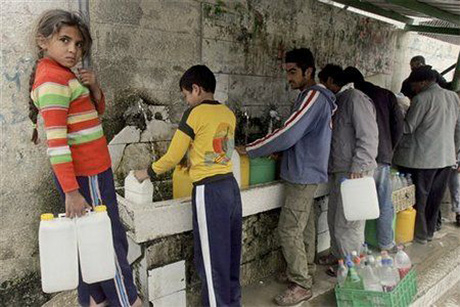Uri Gnorant of the Israeli Bureau of Land Redemption was eager to see
me. “I’m glad you’re here,” he said. “You reporters talk about how
little we do for Palestinians. This is a chance to set the record
straight. When it comes to environmental protection and conservation,
no one could possibly do more than we do.
“Take water, for example. We have reduced Palestinian water consumption
to less than a third of what it was in 1967. Nowhere in the world can
boast such an accomplishment. Even the Israelis themselves cannot match
it. Villages like Beit Furik and Beit Dajan, with a combined population
of around 15,000 get by on only 12 tanker loads of water per day during
the summer, and sometimes less, supplemented by some filthy ground
water for their vegetable gardens. You can’t do better than that.

“Or fire prevention. You remember the terrible Carmel forest fire that
we had in 2010? You never see anything like that in Palestinian areas,
and this is because we removed a lot of the trees as a preventive
measure. Some people say that the Carmel fire was due to the dead
non-native European trees that we planted to hide hundreds of
Palestinian villages that we destroyed in 1948, and that Palestinian
olive and other fruit trees don’t have the same problem. Let me assure
you that olive trees also burn, as our settlers have amply
demonstrated. The solution is for them to be removed, which is the
policy that we have put in place and are diligently pursuing.
|
“Our protection of the Palestinian
marine environment in Gaza is also
unmatched. Over the last twenty years, we have progressively put larger
and larger areas under protection from fishing, so that now the area
available for fishing is less than a fifth of what it used to be, and
most of the fish are not in that area, anyway. We can assure you that
there will be no overfishing in Palestinian waters!
“There are many other ways that we protect the environment that is
exposed to Palestinian abuse. For example, Palestinian women have
gathered wild herbs like thyme and sesame for thousands of years on the
hills and in the valleys of what used to be called Palestine. We have
put a stop to that and made it illegal, so as to protect these plants
from further exploitation.
“We also can’t have grazing animals like sheep and goats eating up the
natural herbs and grasses in the pastures. If Palestinians want fresh
meat, let them buy their feed from Israeli merchants like nature
intended, or get frozen meat from New Zealand, which we are happy to
sell to the humanitarian organizations that keep Palestinians alive.
“As we know, however, human activity inevitably damages the environment
in one way or another, no matter what policies we put in place. Our
long term policy is therefore to eliminate as many of the Palestinian
people as possible from as many places as possible that are under
Israeli control, and also to expand the areas under Israeli control for
the same reason.
“As you can see, our commitment to environmental protection of
Palestinian land is unshakeable. ”
Barb Weir is the pseudonym of a
writer and human rights activist in Northern California.
|

